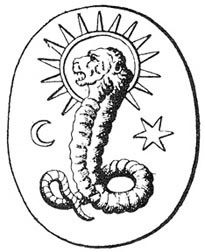Why should you care about the occult, magic, or mysticism if you aren’t religious or don’t believe in the supernatural?
Good question.
I have several possible answers:
1) Even if you don’t believe in this sort of thing there are people in the past and present who genuinely do.
While most of us live in places that don’t condemn suspected witches to death, belief in the supernatural has and still has major consequences. The height of the European witch hunts resulted in the deaths of tens of thousand of people, mostly women, accused of witchcraft and related activities (see The Witchcraft Sourcebook edited by Brian P. Levack, full citation below).
While this is the most dramatic example, occult science has lead directly to the modern fields of astronomy and chemistry via astrology and alchemy. Occult philosophy likewise was influenced by and influenced more mainstream theology and general philosophy. Literature likewise benefits from the occult, resulting in everything from pulpy entertainment to genius works of fiction and poetry.
Whether you believe or not, there is no denying the effects occultism has had on history and culture.
2) Learning about what other people believe in helps you understand their perspective. This fosters respect and personal growth.
As long as another person isn’t pushing their belief on you or infringing on your (or others’) right to live peacefully, it is reasonable to accept that their belief brings them comfort and happiness. For example, if you don’t like yoga there’s no reason that other people can’t practice and enjoy it. Many times ritual practices of any type, spiritual or otherwise, have proven psychological and physical benefits:
Effects of yoga on the quality of life in cancer patients
Mindfulness meditation improves cognition: Evidence of brief mental training
Body temperature changes during the practice of g Tum-mo yoga
3) It’s interesting.
Most people don’t believe in witches and wizards but they still enjoy reading Harry Potter books. The popularity of the series can attest to that much. I personally don’t practice anything occult or mystic myself but I am building an academic career on my interest in it regardless. I grew up reading fantasy novels so studying the occult is like exploring the closest thing to real life fantasy for me. I love the philosophical systems, art, and literature related to the occult. Maybe you’re an author and want to explore new subjects for plots and characters. Maybe you keep seeing tarot cards and crystals everywhere and don’t understand the appeal. General curiosity and interest is likely what brought you here in the first place. On that note:
As the western world becomes disenfranchised with mainstream religions, it looks to alternatives to satiate its spiritual needs. (I say the western world because it’s the only one I personally have a perspective on and feel any authority to speak on). It happened in the 1960s with “new religious movements” like the Hare Krishnas, in the mid-1800s with the spiritualist movements, and as far back as the 14th century with the development of early Kabbalah. There are a multitude other other examples throughout history but the point is that interest in “alternative” beliefs seems to come in waves and in response to things like major disasters or upheavals. Such movements also seem to arise after major periods of skepticism and rationality. Spiritualism rose to prominence shortly after the Enlightenment era which was characterized by its advances in the sciences and rational thought. Today’s popularity of eastern based philosophy, mystical experience, and occultism is likewise in response to a world that is increasingly critical of traditional religions and their dogma.
People who don’t fit into mainstream society, whether it be because of their personality, gender, sexuality, personal philosophy, etc., likewise are at odds with traditional churches and religious organizations. Women have found empowerment in Wicca and Witchcraft, practices that celebrate women and femininity instead of restricting or belittling it. Members of the LGBTQ+ community are attracted to spiritual practices that don’t question or that even embrace their identities in ways that most religions actively condemn. It’s no wonder that in a world that is becoming increasingly accepting of and promoting the individual that people are finding more individualized belief systems.
Spirituality is a nearly universal human need or desire. People want answers to basic questions that rational thought simply can’t divulge. Why are we here? What is my purpose? What happens when I die? Why does the world exist the way it does? Is there a design or purpose? Feeling like an insignificant dot on a ball of rock hurtling through space to an inevitable meaningless destruction causes quite a lot of existential despair in almost anyone who stops to ponder their place in the universe. People combat this feeling in different ways, most without really forming a conscious plan or philosophy. Most just want to feel like they’re connected to something greater than themselves and that it somehow gives them purpose. Religion, spirituality, denial, avoidance, ignorance, or acceptance are the more popular answers to such existential dread. And just because you pretend to know the answer (and you are pretending because none of us really know) doesn’t mean you know or understand someone else’s answer. Which brings me back to point number 2.
2 – Redux) I say this again because it bears repeating: learning about and understanding other viewpoints and perspectives directly correlates to greater empathy, compassion, and tolerance. Ignorance is the enemy.
If you take nothing else away from your foray into occult studies please let it be this. The ultimate goal of the occult is to acquire knowledge that was previously hidden from understanding. It does not necessarily have to be spiritual or supernatural knowledge; any wisdom or information is fair game. That is why the occult advanced science in the aforementioned areas of astronomy and chemistry, its practitioners sought knowledge without bounds and wherever their minds took them. Perhaps many were fettered by dogmas and prejudices of different kinds but like the alchemical process purifies base lead into shining gold, so too should the self strive to purify the mind into a more enlightened form.
Hopefully one or all of these answers have encouraged you to explore the occult further or at least allowed you to understand why others have an interest in it. If you’re still struggling to understand, seek further guidance, or disagree heartily with something I’ve written, feel free to reach out and tell me about it: [email protected]
![]()
Works Cited
Benson, Herbert, et al. “Body temperature changes during the practice of g Tum-mo yoga.” Nature, vol. 295, 1982, pp. 234–236. Bibcode:1982Natur.295..234B. doi:10.1038/295234a0. PMID 7035966.
Levack, Brian P., editor, The Witchcraft Sourcebook. Routledge, 2004.
Rosenkranz, Melissa A., et al. “A comparison of mindfulness-based stress reduction and an active control in modulation of neurogenic inflammation”. Brain, Behavior, and Immunity, vol. 27, 2013, pp. 174-184, ISSN 0889-1591, https://doi.org/10.1016/j.bbi.2012.10.013. (http://www.sciencedirect.com/science/article/pii/S0889159112004758)
Ülger, Özlem, and Naciye Vardar Yağlı. “Effects of yoga on the quality of life in cancer patients.” Complementary Therapies in Clinical Practice, vol. 16, no. 2, 2010, pp. 60-63, ISSN 1744-3881, https://doi.org/10.1016/j.ctcp.2009.10.007. (http://www.sciencedirect.com/science/article/pii/S1744388109001108)
Zeidan, Fadel, et al. “Mindfulness meditation improves cognition: Evidence of brief mental training”, Consciousness and Cognition, vol. 19, no. 2, 2010, pp. 597-605, ISSN 1053-8100, https://doi.org/10.1016/j.concog.2010.03.014. (http://www.sciencedirect.com/science/article/pii/S1053810010000681)



